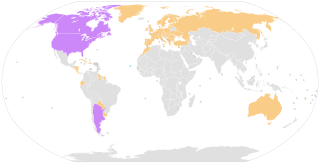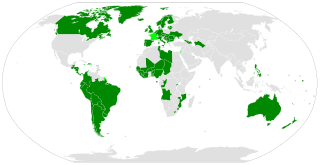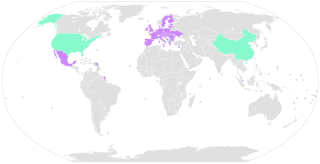The European Convention on Nationality was signed in Strasbourg on 6 November 1997. It is a comprehensive convention of the Council of Europe dealing with the law of nationality. The convention is open for signature by the member States of the Council of Europe and the non-member States which have participated in its elaboration and for accession by other non-member States. The Convention came into force on 1 March 2000 after ratification by 3 countries. As of 2021, the convention has been signed by 29 countries and ratified by 21 of those countries.

The Hague Conference on Private International Law (HCCH) is an intergovernmental organisation in the area of private international law, that administers several international conventions, protocols and soft law instruments.

The Hague Convention on the Civil Aspects of International Child Abduction or Hague Abduction Convention is a multilateral treaty that provides an expeditious method to return a child who was wrongfully taken by a parent from one country to another country. In order for the Convention to apply, both countries must be Contracting States; i.e. both must have adopted the Convention.
In modern society, the role of marriage and its termination through divorce have become political issues. As people live increasingly mobile lives, the conflict of laws and its choice of law rules are highly relevant to determine:

The Brussels Regime is a set of rules regulating which courts have jurisdiction in legal disputes of a civil or commercial nature between individuals resident in different member states of the European Union (EU) and the European Free Trade Association (EFTA). It has detailed rules assigning jurisdiction for the dispute to be heard and governs the recognition and enforcement of foreign judgments.
In conflict of laws, habitual residence is the standard used to determine the law which should be applied to determine a given legal dispute or entitlement. It can be contrasted with the law on domicile, traditionally used in common law jurisdictions to do the same thing.

The Hague Convention on the Law Applicable to Trusts and on their Recognition, or Hague Trust Convention is a multilateral treaty developed by the Hague Conference on Private International Law on the Law Applicable to Trusts. It concluded on 1 July 1985, entered into force 1 January 1992, and is as of September 2017 ratified by 14 countries. The Convention uses a harmonised definition of a trust, which is the subject of the convention, and sets conflict rules for resolving problems in the choice of the applicable law. The key provisions of the Convention are:

The Convention on the Law Applicable to Contractual Obligations 1980, or the "Rome Convention", is a measure in private international law or conflict of laws which creates a common choice of law system in contracts within the European Union. The convention determines which law should be used, but does not harmonise the substance. It was signed in Rome, Italy on 19 June 1980 and entered into force in 1991.

The Hague Convention on parental responsibility and protection of children, or Hague Convention 1996, officially Convention of 19 October 1996 on Jurisdiction, Applicable Law, Recognition, Enforcement and Co-operation in respect of Parental Responsibility and Measures for the Protection of Children or Hague Convention 1996 is a convention of the Hague Conference on Private International Law. It covers civil measures of protection concerning children, ranging from orders concerning parental responsibility and contact to public measures of protection or care, and from matters of representation to the protection of children's property. It is therefore much broader in scope than two earlier conventions of the HCCH on the subject.

The Convention on the Reduction of Statelessness is a 1961 United Nations multilateral treaty whereby sovereign states agree to reduce the incidence of statelessness. The Convention was originally intended as a Protocol to the Convention Relating to the Status of Refugees, while the 1954 Convention Relating to the Status of Stateless Persons was adopted to cover stateless persons who are not refugees and therefore not within the scope of the Convention Relating to the Status of Refugees.

International child abduction in Japan refers to the illegal international abduction or removal of children from their country of habitual residence by an acquaintance or family member to Japan or their retention in Japan in contravention to the law of another country. Most cases involve a Japanese parent taking their children to Japan in defiance of visitation or joint custody orders issued by Western courts. The issue is a growing problem as the number of international marriages increases. Parental abduction often has a particularly devastating effect on parents who may never see their children again.
International matrimonial law is an area of private international law. The area specifically deals with relations between spouses and former spouses on issues of marriage, divorce and child custody. In the last 50 years, the States Members of the Hague Conference on Private International Law have attempted to harmonize domestic matrimonial laws and judicial rulings across international borders in these areas.
The term international child abduction is generally synonymous with international parental kidnapping,child snatching, and child stealing.
The Convention of 1961 Concerning the Powers of Authorities and the Law Applicable in Respect of the Protection of Infants, French: Convention du 5 octobre 1961 concernant la compétence des autorités et la loi applicable en matière de protection des mineurs, or Hague Protection of Minors Convention is a multilateral convention of the Hague Conference on Private International Law. The 1961 Convention emphasized the concept of the "interests of the child" as a basis for authorities of the child's nationality to overrule the authorities of the child's habitual residence. It built upon prior efforts to create successful multilateral treaties and brought an innovation in terminology by creating a compromise between advocates of "nationality" as the determining factor for jurisdiction and advocates for the modern fact-centric model of "habitual residence." The convention also included expanded language to encompass both judicial and administrative authorities in response to the Boll case. Of particularly special note, the drafters of the 1961 Convention expressly considered a provision addressing the removal of a child from their habitual residence with an intent to evade rightful jurisdiction—primarily for child custody reasons. This first attempt to codify international child abduction failed due to an inability to agree on a definition or manner of describing the phenomenon, with a number of countries that adhered to the principle of nationality regulating personal child and family law unable to classify their nationals removing children from foreign countries to their home state as illegal.

Brussels II Regulation (EC) No 1347/2000, which came into force on 1 March 2001, sets out a system for the allocation of jurisdiction and the reciprocal enforcement of judgments between European Union Member States and was modelled on the 1968 Brussels Convention on Jurisdiction and the Enforcement of Judgments in Civil and Commercial Matters. It was intended to regulate domains that were excluded from the Brussels Convention and Brussels I. The Brussels II Regulation deals with conflict of law issues in family law between member states; in particular those related to divorce and child custody. The Regulation seeks to facilitate free movement of divorce and related judgments between Member States.

The Hague Divorce Convention, officially Convention on the Recognition of Divorces and Legal Separations is a convention concluded by the Hague Conference on Private International Law (HCCH). It regulates the recognition of divorces and legal separations provided they have been performed according to the correct legal process in the state where the divorce was obtained. Not all divorces need to be recognized under the convention. Only those divorces obtained in a state where ;

The Maintenance Regulation (EC) No 4/2009, formally the Council Regulation (EC) on jurisdiction, applicable law, recognition and enforcement of decisions and cooperation in matters relating to maintenance obligations, is a European Union Regulation on conflict of law issues regarding maintenance obligations. The regulation governs which courts have jurisdiction and which law it should apply. It further governs the recognition and enforcement of decisions. The regulation amends the Brussels Regulation, which covers jurisdiction in legal disputes of a civil or commercial nature between individuals more broadly.

The Hague choice of court convention, formally the Convention of 30 June 2005 on Choice of Court Agreements, is an international treaty concluded within the Hague Conference on Private International Law. It was concluded in 2005, and entered into force on 1 October 2015. The European Union, Denmark, Mexico, Singapore, Ukraine and the United Kingdom are parties to the convention. Albania, China, Israel, North Macedonia and the United States signed the convention, but did not ratify.
Surrogacy is legal in New Zealand if it is performed altruistically, where the surrogate donates her services selflessly, without any compensation beyond the coverage of expenses. Commercial surrogacy, where the surrogate is paid in addition to the coverage of expenses, is not legal. There is a lack of specific legislation and regulations dealing with surrogacy, though the recent increase in surrogacy cases has led to a number of amendments. New Zealand is party to the United Nations Convention on the Rights of the Child, and ratified it in April 1993. The primary principle of this convention is that the best interests of the child are paramount, which must then encompass all surrogacy agreements and regulations. The lack of clear surrogacy legislation in New Zealand has led to many couples engaging in reproductive tourism in order to ensure the surrogacy is successful. This has the potential to significantly impact the human rights of all of the parties involved.

The Hague Judgments Convention, formally the Convention of 2 July 2019 on the Recognition and Enforcement of Foreign Judgments in Civil or Commercial Matters is an international treaty concluded within the Hague Conference on Private International Law. It was concluded in 2019, and entered into force on 1 September 2023 for the European Union and Ukraine. The convention governs the recognition of judgements in civil and commercial matters.














